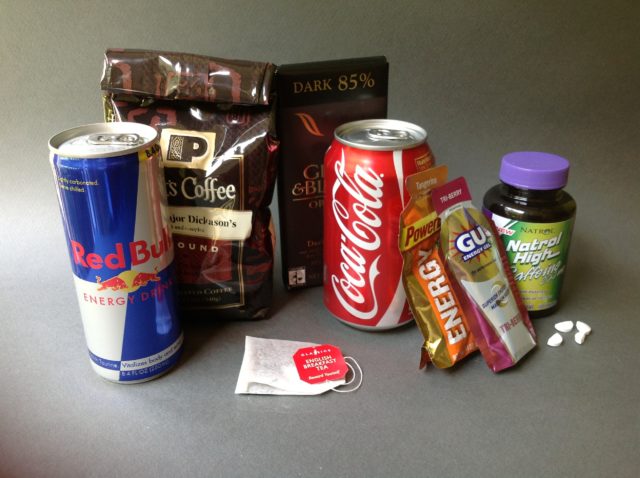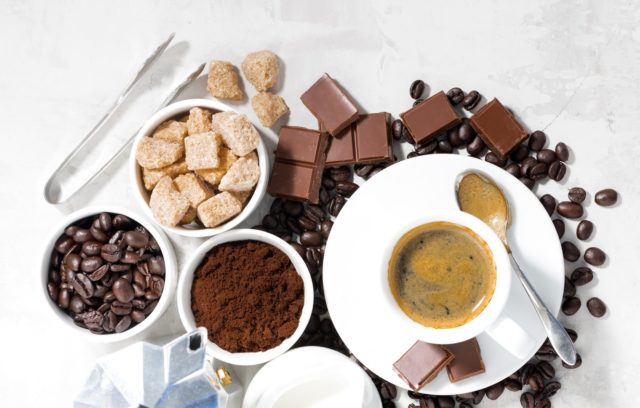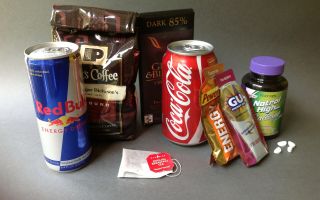Content
Foods containing caffeine are essential for toning the body and stimulating peristalsis. They can have both harmful and beneficial effects. It depends on the dosage and the health status of the person. When consumed in moderation, caffeine is extremely beneficial.
Effect of caffeine on the body
Caffeine is a naturally occurring alkaloid. It is found in some drinks and foods. Caffeine can have a stimulating effect on the central nervous system, thereby increasing the heart rate and promoting the expansion of blood vessels. Its intake into the body is more appropriate in the morning hours, when there is a need for a vigorous state. Before going to bed, caffeine can trigger insomnia.
The principle of influence on the body is largely determined by the dosage. With excessive use, it can provoke addiction. Foods that contain caffeine have the following effects on the human body:
- stimulation of peristalsis;
- diuretic effect;
- acceleration of metabolic processes in the body;
- increased concentration of attention;
- prevention of cardiovascular diseases;
- replenishment of the energy reserve;
- elimination of drowsiness.

Caffeine is often included in medications for headaches. Its action is based on the stimulation of adrenaline production while suppressing the phosphodiesterase enzyme. In therapeutic dosages, the substance has a positive effect on health, and, if abused, causes adverse reactions. With excessive intake, it is dangerous for dehydration.
Daily rate
For 1 time, doctors recommend using no more than 200 mg of the substance. The permissible number of receptions per day is no more than 3. If we talk about coffee, its variety is of great importance. An instant drink contains less potentially dangerous substance than a natural drink brewed in a Turk.
Signs of lack
The lack of a tonic alkoloid occurs only when addiction is formed. This happens with excessive consumption of foods with its content for a long time. On this basis, withdrawal symptoms develop. If a person is not addicted to caffeine, then the body does not need it. The main symptoms of a lack of substance include:
- increased irritability;
- headache;
- insomnia at night;
- drops in blood pressure;
- general malaise;
- increased fatigue during the daytime.
Signs of excess
When consumed regularly, foods high in caffeine can be harmful to health. In this case, physical and psychological dependence develops.As a result, a person ceases to control the volume of consumed caffeinated products. Excessive stimulation of adrenaline leads to the appearance of characteristic symptoms. Its intensity directly depends on the degree of neglect of the problem. The most common signs of a substance overdose include:
- trembling limbs;
- heart palpitations;
- dizziness;
- migraine;
- dryness of the oral mucosa;
- redness of the skin.
In acute poisoning, increased nervousness is observed. Insomnia becomes the most important problem. In some cases, concentration of attention is reduced and confusion occurs. The external signs of an overdose of a substance include the cyanosis of the nasolabial triangle.
Digestibility
The half-life of an alkoloid is 5 hours. The necessary tonic effect is observed 20-30 minutes after the consumption of the product containing the substance. This period is characterized by a surge of energy and increased urination. The substance is absorbed quite easily, but it has an irritating effect on the mucous membrane of the digestive system.
Why caffeine is good for you
Despite the controversial effects on the body, caffeinated foods may be beneficial. In some diseases, they improve well-being. Their moderate consumption helps to increase physical and mental activity. Other beneficial properties of the substance include:
- stimulation of the secretory activity of the digestive tract;
- antispasmodic effect;
- reducing the risk of diabetes mellitus;
- expansion of the bronchi;
- prevention of cardiovascular diseases;
- normalization of metabolism;
- elimination of signs of fatigue and increased drowsiness;
- increased efficiency.

Caffeine helps to increase the physical endurance of the body, which has a positive effect on the quality of human life. By increasing adrenaline in the blood, it improves mood and normalizes performance. In addition, the substance contains vitamin B12 and pantothenic acid. These substances take part in metabolic processes.
According to medical research, regular consumption of caffeine reduces the risk of diabetes by up to 20%. For older people, the substance is useful in preventing Alzheimer's disease. This effect is achieved by suppressing neurodegenerative changes in the body.
Who Should Look For Caffeine-Rich Foods
The caffeine content of different foods may vary. Some have a powerful tonic effect, while others have a mild effect. It is especially important for people to whom it is contraindicated to know about the amount of caffeine in a particular product. It is advisable to exclude caffeine from the diet in the following cases:
- diseases of the stomach and duodenum;
- glaucoma;
- Iron-deficiency anemia;
- hypertension;
- sleep disorders;
- pregnancy;
- the period of treatment with antidepressants and oral contraceptives;
- mental disorders.
People with nervous system disorders are much more likely to be exposed to an excess of caffeine. Products with its content relieve anxiety and increase performance only for a while. This is why the problem can get worse.
What foods contain caffeine
The tonic alkaloid is found not only in natural coffee, but also in other products. A person may not realize that a substance enters his body in large quantities. To prevent this from happening, it is necessary to analyze the composition of the diet. The list of foods containing caffeine is as follows:
- green tea;
- chocolate;
- coffee desserts;
- energetic drinks;
- quick breakfasts;
- meat;
- sunflower seeds.
Foods high in caffeine
The richest sources of caffeine are considered green tea, coffee, and energy drinks. That is why they are recommended to drink in strictly limited quantities and only in the first half of the day. The amount of caffeine in green tea depends on the degree of maturity of the plant, the principle of fermentation and additional processing of raw materials. Dark chocolate also contains caffeine. It saturates the body with energy, but less often provokes side symptoms.
Which product has the most caffeine
Many products contain caffeine, but coffee takes the leading position in its content. It contains many antioxidant substances that protect the human body from the harmful effects of free radicals and start metabolic processes. Its presence in the diet in moderation ensures that the energy supply is maintained at the required level.

Is there a caffeine overdose
Since caffeine is a psychostimulant, if consumed in excess, it can cause unwanted complications. First of all, with an overdose, the nervous, cardiovascular and digestive systems suffer. Severe intoxication can lead to confusion and epileptic seizures. But most often, an excess of a substance is accompanied by the following symptoms:
- tremor of the limbs;
- tachycardia;
- anxiety;
- an increase in blood pressure;
- headache.
First aid is to provide oxygen access by opening a window. It is equally important to immediately call an ambulance. To remove excess alkoloid from the body, absorbent drugs should be taken. These include Enterosgel and activated carbon. You should also drink as much liquid as possible.
Caffeine Table
To get an idea of the caffeine content in food, a table with an exact indication of the amount of substance will help.
|
The product's name |
Serving volume (ml) |
Caffeine content (mg) |
|
Natural coffe |
220 |
135 |
|
Instant coffee |
220 |
95 |
|
Dark chocolate |
100 |
40 |
|
Cocoa |
220 |
5 |
|
Green tea |
220 |
30 |
|
Coca Cola |
330 |
34,5 |
The amount of substance in the chocolate can vary, depending on the percentage of cocoa in the composition. It is present in smaller quantities in milk chocolate products. Its volume in green tea is influenced by the duration of the brewing of the drink. The longer the tea is kept covered, the higher the caffeine content will be.
When to see a doctor
Long-term consumption of foods containing caffeine in excess of them can harm your health. The first alarm calls include epigastric pain and increased nervousness. In this case, you need to see a doctor for a general examination of the body. If the diet contains a lot of caffeine, the risk of exacerbation of diseases of the digestive system increases.
A visit to the doctor is also necessary when symptoms of acute intoxication appear. Drugs may be required to remove the substance from the body. Their appointment is carried out by a specialist.
It should be remembered that the alkoloid has the ability to flush calcium and iron from the body. With problems with the musculoskeletal system and iron deficiency anemia, this quality is very critical. There is a risk of worsening the disease with further complications.
Conclusion
Products containing caffeine should be consumed in moderation. This will avoid possible health complications. In minimal dosages, the substance has absolutely no destructive effect.

